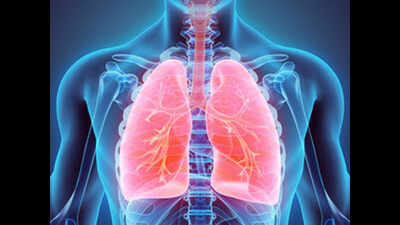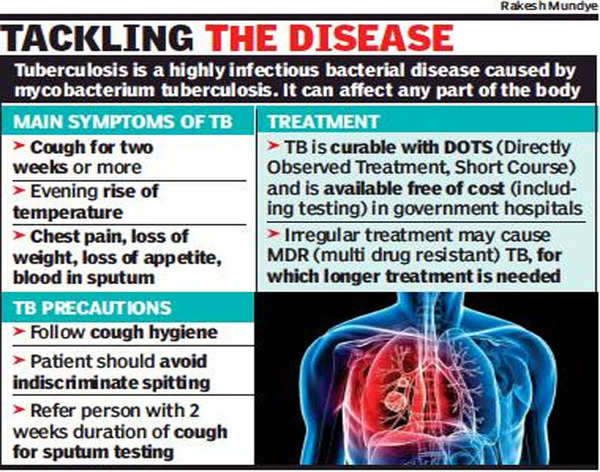Trending
This story is from February 4, 2019
Detection of TB up due to inputs from private doctors

Representative image
PANAJI: The directorate of health services (DHS) registered an increase of 19% in tuberculosis (TB) cases for 2018, and has attributed this achievement to better diagnostic facilities, complemented by reporting by private practitioners of cases treated by them. Around 2,200 TB cases were registered in 2018.
Dr Maximiano De Sa, chief medical officer and in-charge of the revised national tuberculosis programme, said that the introduction of CB-NAAT for early and definitive diagnosis of tuberculosis has helped detection.
The increase in detection, Dr De Sa said, “was mainly due to improved notification by the private sector. Goa has a strong private sector and despite free treatment and diagnosis, people prefer to visit private doctors due to privacy issues.”
Earlier, the private sector seldom intimated TB cases to DHS, thus making it difficult to arrive at a correct number of TB patients within a particular area or state. Almost half of the total cases were notified by them, he said.

A notification issued in March last year by the food and drugs administration (FDA) has made it mandatory for chemists disbursing anti-tuberculosis drugs to notify authorities about TB patients.
Dr De Sa said people prefer not to reveal their status and hence choose to go to a private doctor, even though drugs are disbursed free of cost by the government. Patients treated at non-government facilities can avail of anti TB drugs free of cost, provided the doctor concerned notifies the authority of his TB patients, Dr De Sa said. Private doctors, clinics and caregivers are required to notify authorities about such cases.
Besides better facilities for detection of the stigmatised disease, test results can be obtained within two hours through CB-NAAT, he said. Earlier, sputum samples had to sent to laboratories outside Goa, he added.
The newly-introduced anti-TB drug has aided in getting postive results. The new drug is a combination of four anti-TB drugs, and patients are not required to take multiple drugs, which also reduces the risk of missing intake of any one drug, Dr De Sa said. If patients does not take anti-TB drugs as prescribed, they run the risk of developing multi drug resistant (MDR) TB.
The Centre has also rolled out the NIKSHAY programme for TB patients. Under this system, patients are provided Rs 500 a month for nutritional support for six months. Money is transferred directly into patient’s bank account. Monetary benefit is also available for patients taking treatment privately, provided they submit bank details to the authorities concerned.
In Goa, over 1,100 patients have benefitted under NIKSHAY till date. Those who have been left out are only a few who don’t want to share their details due to privacy issues.
As far as MDR TB is concerned, about 60 cases were reported in Goa in 2018, with one-third of the patients originating from outside Goa.
Dr Maximiano De Sa, chief medical officer and in-charge of the revised national tuberculosis programme, said that the introduction of CB-NAAT for early and definitive diagnosis of tuberculosis has helped detection.
The increase in detection, Dr De Sa said, “was mainly due to improved notification by the private sector. Goa has a strong private sector and despite free treatment and diagnosis, people prefer to visit private doctors due to privacy issues.”
Earlier, the private sector seldom intimated TB cases to DHS, thus making it difficult to arrive at a correct number of TB patients within a particular area or state. Almost half of the total cases were notified by them, he said.

A notification issued in March last year by the food and drugs administration (FDA) has made it mandatory for chemists disbursing anti-tuberculosis drugs to notify authorities about TB patients.
Dr De Sa said people prefer not to reveal their status and hence choose to go to a private doctor, even though drugs are disbursed free of cost by the government. Patients treated at non-government facilities can avail of anti TB drugs free of cost, provided the doctor concerned notifies the authority of his TB patients, Dr De Sa said. Private doctors, clinics and caregivers are required to notify authorities about such cases.
Besides better facilities for detection of the stigmatised disease, test results can be obtained within two hours through CB-NAAT, he said. Earlier, sputum samples had to sent to laboratories outside Goa, he added.
The newly-introduced anti-TB drug has aided in getting postive results. The new drug is a combination of four anti-TB drugs, and patients are not required to take multiple drugs, which also reduces the risk of missing intake of any one drug, Dr De Sa said. If patients does not take anti-TB drugs as prescribed, they run the risk of developing multi drug resistant (MDR) TB.
The Centre has also rolled out the NIKSHAY programme for TB patients. Under this system, patients are provided Rs 500 a month for nutritional support for six months. Money is transferred directly into patient’s bank account. Monetary benefit is also available for patients taking treatment privately, provided they submit bank details to the authorities concerned.
In Goa, over 1,100 patients have benefitted under NIKSHAY till date. Those who have been left out are only a few who don’t want to share their details due to privacy issues.
As far as MDR TB is concerned, about 60 cases were reported in Goa in 2018, with one-third of the patients originating from outside Goa.
End of Article
FOLLOW US ON SOCIAL MEDIA











